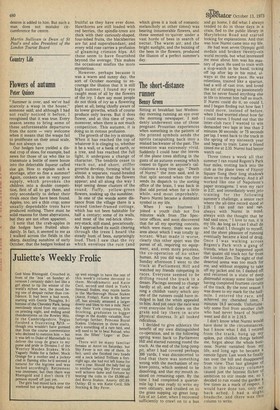The short-distance runner
Benny Green
Sitting at breakfast last Wednesday morning running an eye over the morning newspaper, I suddenly 'underwent one of those pregnant Proustian experiences when something in the pattern of the printed symbols sends the spirits catapulting back into a mislaid backwater of the past. The sensation was extremely vivid. Suddenly I could hear the leaves of the plane trees Shifting in the gusts of an autumn evening which ceased to figure in anyone's calculations a long time ago. " Death of Nurmi" the item said, and in that split second when the eye sends its dispatch to the sorting office of the brain, I was back in that odd period when for a little while, ,and most improbably, Paavo Nurmi became a dominant symbol in my life.
When I was fourteen I joined a youth club not five minutes walk from The Spectator offices, and soon discovered that for all my sporting conceits, which were many, there was one area about which I was totally ignorant. What made it worse, clearly this other sport was the purest of all, requiring no equipment, and, even more priceless, the co-operation of no other human. All you did was run. One Sunday afternoon I went to the track at Parliament Hill and watched my friends competing in races. Everyone seemed to be drifting round the track in a dream. Placings seemed to change hardly at all, and the act of winning a childish vanity which any one of the runners could have indulged in had the whim appealed to him. And yet once the race was over everyone fell down on the grass and lay there in acute physical distress. It all looked ridiculous.
I decided to give athletics the benefit of my own distinguished co-operation, and in the following spring went back to Parliament Hill and started running round the track. At the end of the long-jump pit, after I had covered perhaps 300 yards, I was disconcerted to find that there was something wrong with the mechanism of my knee-joints, which seemed to be dissolving, and that my mouth insisted on remaining open. By the time I had completed a quartermile lap I was ready to write my own obituary, and crashed on to the grass supping up great lungfuls of air. Later, when I recovered sufficiently to crawl on to a bus
Spectator October 13, 1973
and go home, I did what I always tended to do in those days in a crisis, fled to the public library in Marylebone Road and started looking for explanations. And that was how Nurmi came into my life.
He had won seven Olympic gold medals and broken twenty-six world records, but what interested me most about him was his mastery of pace. He used to train with a stop-watch in his hand, ticking off lap after lap in his mind, always at the same pace. He was relentless, trained like a spartan, had a will of cast iron, and loved the act of running so passionately that he never found anything else in life to interest him half as much. If Nurmi could do it, so could 1, and I began finding out how fast I could move, instead of before, when 1 had worried about how far I could move. I found out that the inter-club race I wanted to win demanded two laps in less than 2 minutes 30 seconds; or 75 seconds per lap. I went back to the track in the spring of my sixteenth year and began to train. Later a friend timed me at 2.35. Nurmi had better watch out.
Three times a week all that summer I ran round Regent's Park four miles, trotting back into the club as the plane trees of Fitzroy Square flung their long shadows down on to the roadway. And it all worked like one of Napoleon's paper stratagems. 1 won my race in 2.27, and immediately went ,into training for the following summer's challenge, a senior race where the all-time record stood at 2.19. 1 ran and ran and ran, always with Nurmi in mind, always with the thought that he had said once, "I love to run, it is my life. As long as I can I shall do so." So shall I, I thought to myself. and the sheer pleasure of running eventually became a kind of drug. Once was walking across Regent's Park with a gang of friends, when he happened upon that quaint old track not far from the London Zoo. The sight of that deserted arena was too much for me, and without stopping to take off my jacket and tie, I dashed off and returned in a state of deep .distressful ecstasy some time later having completed fourteen circuits of the track. By the next season I was down to my mark for the half
mile. I entered the race, and achieved my cherished time, 2 minutes 18.3 seconds. Unfortunately some fool from another club who had never heard of Nurmi went and did it in 2.16.5.
I don't know what Nurmi would have done in the circumstances,
but I know what I did. I retired from the track, hung up mY spikes, put childish things behind me, forgot about the whole busi ness. Nurmi vanished from my life, and long ago he became a remote figure. Last week he finally ran over the hill and disappeared from view. That last glimpse of him in the obituary columns caused just the faintest flicker of ambition to stir inside me, so 1 decided to run round the garden a few times as a mark of respect. 1 would have done too, only my back ached, I had a slight headache, and there was this column to write.


































 Previous page
Previous page